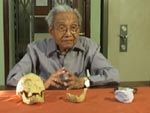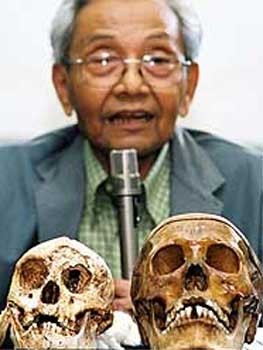
November 20, 2007

I have learned, belatedly, of the death a month ago of the major critic of the separate uniqueness of the Homo floresiensis species. Professor Teuku Jacob (December 6, 1929 – October 17, 2007) of the Gadjah Mada University in Yogyakarta, Java, has died.
One of the main arguments from Homo floresiensis debunker Teuku Jacob had been that the little people were merely representatives of the local people and/or microcephalics in the local population.
Jacob came under fire during the debate for his mishandling of the fossils when they were loaned to him. Professor Teuku Jacob not only allegedly destroyed some of the bone specimens, but he even glued one fractured bone together to mask the damage. Jacob reportedly also washed and dissolved the LB1 skull in acetone to make it impossible to extract any DNA for analysis, David Perlman, San Franscisro Chronicle Science Editor, discovered in 2006.
Jacob was also known for gathering all the fossils he could from various collections said to belong to Indonesian paleontology and then for locking them away from further study, unless he approved of the research. He once flew to New York City to obtain from an antique dealer a skull with a disputed history. He claimed it was Indonesia’s. He flew it quickly back to his vault before a clear understanding of the exact origins of the apparent Homo erectus skull could ever be made. Today, the story surrounding this skull, Homo erectus newyorkensis, is infrequently discussed in paleoanthropolgical circles.
Later research on multiple fossil individuals of the so-called Hobbits, as well as published analysis of their brains, overturned much of what Dr. Jacob had been critically saying. But his face and name were tied in his late years to the Flores fossil evidence debate.

Perhaps those studying Homo floresiensis can move on from this chapter now. Will the moratorium on further archaeological digs on Flores, imposed due to Jacob’s influence, be lifted more firmly?
The time is now, however, for Teuku Jacob’s contributions to Indonesian paleontology, politics, nationalism, and independence to be remembered, and the sadness of his family and countrymen be acknowledged and respected.
Indonesian paleontologist Teuku Jacob, who died [October 17, 2007] from a liver disease, was known for his firm scientific judgments, including his opinion on the “Hobbit” fossils found on an island in East Nusa Tenggara province. A public funeral ceremony was held at Gadjah Mada University (UGM) in Yogyakarta on Thursday before Jacob’s body was moved to its final resting place in the university’s cemetery. Hundreds of academics, administrative staff, students, former rectors, and colleagues, friends and relatives of Jacob attended the ceremony that ended with a military salute for the recipient of the 2002 Bintang Mahaputra Nararia State Award.
Born in Peureulak, Aceh, on Dec. 6, 1929, Jacob passed away [October 17, 2007] at Dr. Sardjito Hospital after being treated there since Oct. 4 for liver problems he had been suffering for years.
He is survived by his wife, Nuraini Jacob, and daughter, Nila Nurilani Jacob.
“We remember him as a true nationalist as shown by his opinion regarding the discovery of the Liang Bua skeleton in Flores,” Suryo Guritno, chairman of the university’s Assembly of Lecturers (MGB), said in his remarks at the ceremony.
Jacob made headlines in 2004 when he expressed his opposition to Australian scientists’ claims the Liang Bua skeleton belonged to a new species and should thus be renamed Homo floresiensis.
Jacob, on the contrary, insisted the skeleton was not a new species but simply a fossil of an ordinary modern human being.
“It is not a new species. It is a sub-species of Homo sapiens classified under the Austrolomelanesid race. If it’s not a new species, why should it be given a new name?” Jacob had told a press conference in 2004.
“So, if they (the Australian scientists) say the skeleton was the ancestor of the Indonesian people, forget it,” he added.
During his service at the university, Jacob was acknowledged as a dedicated scientist. Even after he officially retired, he often worked in the university’s bioanthropology and paleoanthropology laboratory.
“He also attended meetings both at national and international levels,” said Suryo Guritno, adding that the July 2007 Paleoanthropology International Seminar was the last such event he had attended.
“Indonesia in general, and the UGM in particular, has really lost one of its best sons,” Guritno said.
Jacob started his career at UGM in 1953 as an anatomy student assistant in the university’s School of Medicine and then as an anthropology assistant. He graduated from the school in 1956.
He was the School of Medicine’s secretary from 1973 t0 1975, dean of the school from 1975 to 1979 and rector of UGM from 1981 to 1986. He was also a member of the Indonesian People’s Consultative Assembly (MPR RI) from 1982 to 1987.
He was declared an Honorary Citizen of The Sunshine City-Mayor of Tucson (1958) and included in the International Biographical Directory of Southeast Asian Specialists (1969), International Directory of Anthropologists (1975), Marquis Who’s Who in the World (1980-1998), as well as being awarded the Paul Broca-CNRS Medal (1980), gold medal from the Indian Board of Alternative Medicine (1993) and the Hamengkubuwono IX Award (1997).
A regular columnist for a local newspaper here, Jacob was also involved in important projects and work. Among them include the finding, identification and publication of human fossils from Indonesia and the establishment of a numbering system for human fossils.
Other projects included the rescue and exploration of human and animal fossils, the development of a counter-theory on prehistoric cannibalism and a study of human taxonomy. He was also a consultant for the world heritage Sangiran site. ~ by A. Junaidi and Sri Wahyuni, Planet Mole.
Thanks to Remote Control for the news of this death.
About Loren Coleman
Loren Coleman is one of the world’s leading cryptozoologists, some say “the” leading living cryptozoologist. Certainly, he is acknowledged as the current living American researcher and writer who has most popularized cryptozoology in the late 20th and early 21st centuries.
Starting his fieldwork and investigations in 1960, after traveling and trekking extensively in pursuit of cryptozoological mysteries, Coleman began writing to share his experiences in 1969. An honorary member of Ivan T. Sanderson’s Society for the Investigation of the Unexplained in the 1970s, Coleman has been bestowed with similar honorary memberships of the North Idaho College Cryptozoology Club in 1983, and in subsequent years, that of the British Columbia Scientific Cryptozoology Club, CryptoSafari International, and other international organizations. He was also a Life Member and Benefactor of the International Society of Cryptozoology (now-defunct).
Loren Coleman’s daily blog, as a member of the Cryptomundo Team, served as an ongoing avenue of communication for the ever-growing body of cryptozoo news from 2005 through 2013. He returned as an infrequent contributor beginning Halloween week of 2015.
Coleman is the founder in 2003, and current director of the International Cryptozoology Museum in Portland, Maine.
Filed under Artifacts, Breaking News, Conspiracies, Cryptotourism, CryptoZoo News, Cryptozoologists, Cryptozoology, Fossil Finds, Homo floresiensis